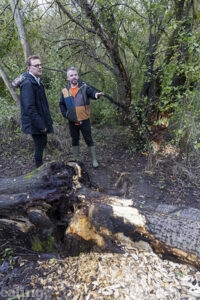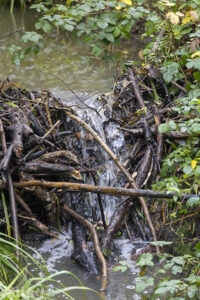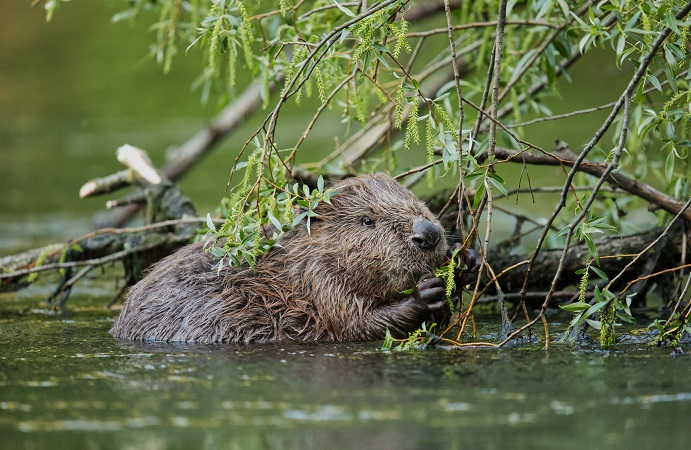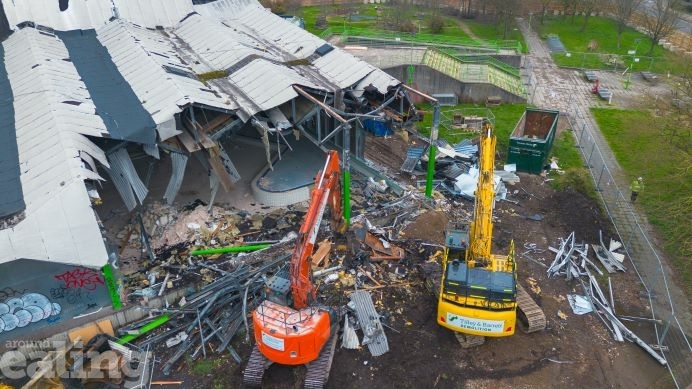In a historic step forward for urban rewilding, 2 separate beaver reintroduction projects in north west London—one in Greenford and another in Enfield —are thriving.
Both projects have been the result of partnerships between local councils, environmental groups, and Capel Manor College. They have also both marked remarkable progress since beavers were reintroduced to the capital for the first time in centuries.
Together, the Enfield and Greenford sites demonstrate the extraordinary benefits these ‘ecosystem engineers’ bring to urban landscapes, from enhancing biodiversity to reducing flood risks for local communities.
As you will find out, beavers being born ‘in the wild’ in London is fast becoming a regular thing…and in the future, some could potentially be moved to other parts of the country if, as hoped, other official rewilding projects spring up across the UK.
A year on…
It is now a year since beavers returned to the borough for the first time in 400 years as part of a rewilding project at Paradise Fields. Greenford’s new residents have been very busy.
“They got to work straight away, modifying the environment and improving it,” said Sean McCormack of Ealing Beaver Project, a group of organisations that teamed-up with Ealing Council on the project, and now manages the site at Paradise Fields.

“It’s remarkable how much difference they have already made in a year,” said council leader Peter Mason.
As well as building 5 dams, pollarding trees, and making themselves generally feel at home, the beaver couple have had babies too. They came to the site with some young and then, only a couple of months ago, a couple more tiny beaver kits were born. The babies are growing up fast, being taught by their parents how to help with dam building, and more.
But that’s not all.
Sean said: “We’ve been monitoring water quality, which has improved by over 50%. They’ve clarified the water because their dams act as a giant filtration system.”
This work has not gone unnoticed, with new species of birds – including kingfishers – being attracted to the site, along with new species of bats, drawn to Paradise Fields by an explosion of insect life hatching out too.
‘A magic pill’
Sean added: “So, already, we’re seeing the beavers having a big impact and very quickly and we think that’s only going to improve with time. They’re described as a biodiversity ‘magic pill’ that you can drop into a system, and they create life for lots of other things. And the proof is already there.”
Emily Bowen from the Beaver Trust said: “Beavers are a native species, and they’re often referred to as ‘ecosystem engineers’ and a keystone species. And that’s because they have such a huge impact on the landscape.
“Lots of people ask about what that what their diet is. They’re purely plant based. They eat anything from herbs to the cambium layer of the tree just under the bark. They then use the rest of the wood for building their dams and lodges.”
Good neighbours
The heavy rainfall in October led to flooding in various parts of the borough, including Greenford – but not the area of Greenford downstream from Paradise Fields, which was not affected at all.
Councillor Mason said: “The beaver project is a great example of how the council is working with community groups and local volunteers to help with nature recovery. By being here, the beavers should invigorate nature and biodiversity across the whole area. But that’s not all. They should also help to prevent flooding and drought. Meaning, local communities benefit too.”

London leading the way
Who would have expected that north west London would become a hotbed of beaver rewilding?
The beavers were introduced to Paradise Fields last year as a monitored 5-year trial, and this and other urban projects will hopefully eventually provide blueprints for future releases across the UK. You can pop down for visits and, in the warmer months, for guided tours with the Ealing Beaver Project.
In Enfield, a collaboration between Enfield Council and Capel Manor College – London’s only environmental college – has been running a similar, but separate, project since 2022, with the support of the Beaver Trust. It was the first London rewilding of beavers, returning the native species to the capital after a gap of 400 years.
The College, which has five campuses across London, includes two in close proximity: one in Enfield and the other at Gunnersbury park. Students at the college have the rare opportunity to be involved in many of the conservation activities with Enfield beaver project, helping to maintain and monitor the site, as well as taking part in various flora and fauna counts to measure the impact of the beaver introduction on the local ecosystem.
Since release in 2022, the beaver pair has had 2 sets of kits – with the latest 4 kits being born around the same time as those born in Greenford.
It means there are now 7 beavers at the Enfield site, near the Forty Hall Estate.
‘Really meaningful project’
Much like the project in Ealing, Meg Wilson, animal collections manager at the college, said getting involved had not only been about the huge biodiversity benefits it would likely bring. She said: “We suffered from a lot of flooding down on our farm in Enfield so we thought getting involved with projects like this would be a great way of getting together with the council, mitigating the flooding and creating a really meaningful project for everyone: for our local environment, the community, and our students.
“We’ve started creating education opportunities and signage. It’s wonderful and we want to do more in that area.
“Our students do everything from surveying the site to actually practically getting involved with going down, setting the camera traps, going through the footage, making sure we are looking at all the footage and then identifying that the beavers are healthy and their welfare is monitored.”
As both Greenford and Enfield continue to see positive environmental impacts, these beaver projects could offer a blueprint for future rewilding efforts in urban areas across the UK. With growing numbers of beavers in both locations, the projects highlight how even city-based rewilding can bring nature closer to people, while making cities more resilient to climate change challenges like flooding.







